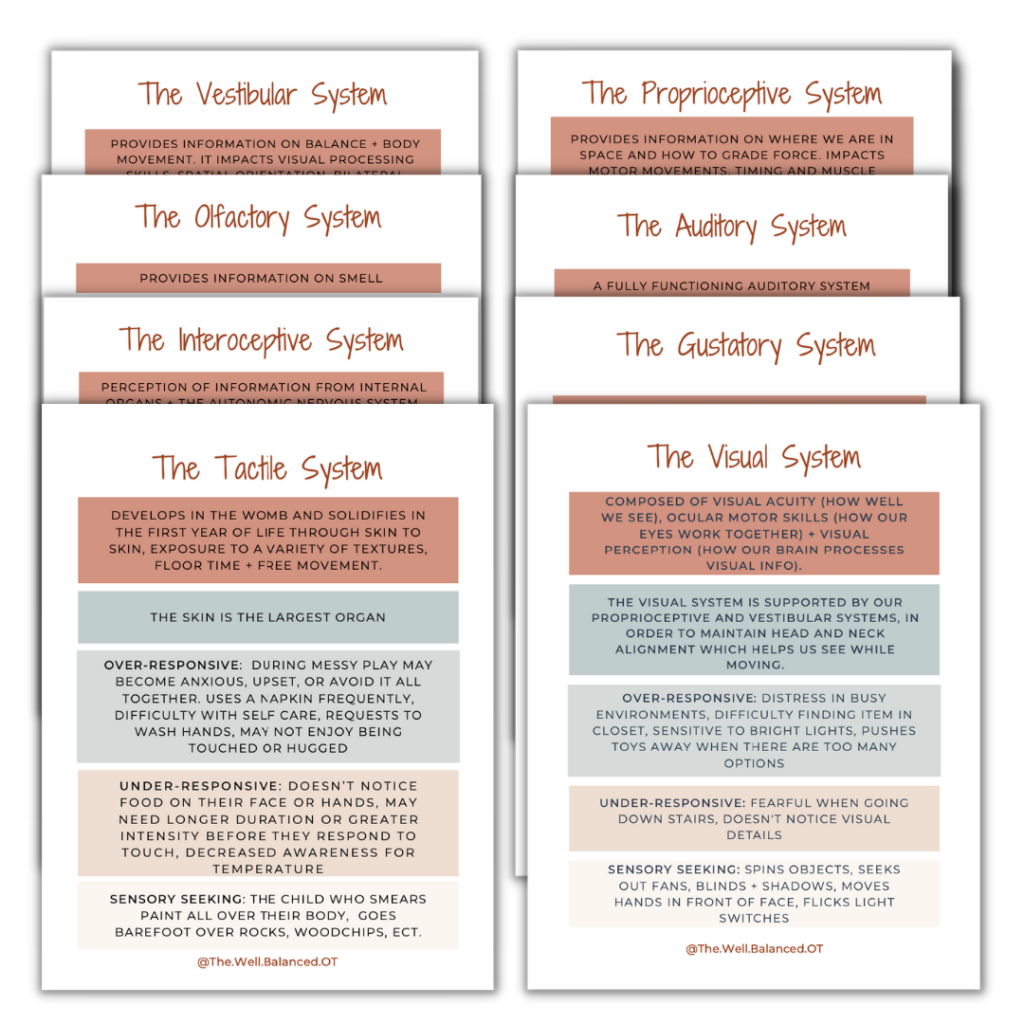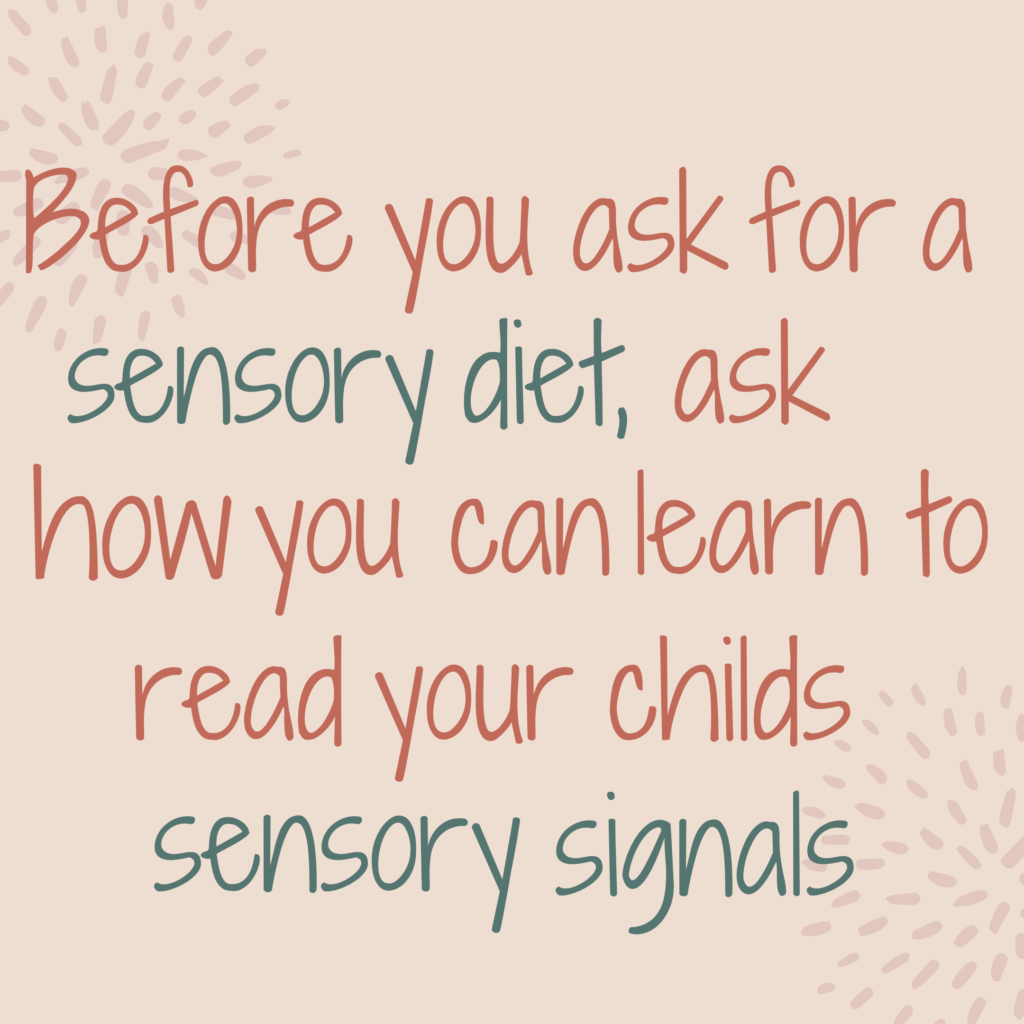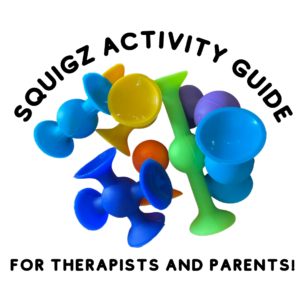Yes, 8 Sensory Systems! I know what you are probably thinking. “But I thought there were only 5”?? There are actually 8 systems, all of which help us interact and engage with our environment and our body. Let’s dive into each system!
We’ll start with the 5 sensory systems you are familiar with:
Sense of Smell (Olfactory)
This is an easy one. It’s everything we smell. Its primary use is for safety, but we also enjoy all the other benefits of smelling flowers, food, and brand new babies. This sense is strongly connected to our sense of taste.
Fun fact: I don’t have a sense of smell. The only things I can smell are hot sauce and sometimes peppermint and I think that has more so to do with the tingling sensation my nose experiences. I can taste the basics like salty, sweet, and spicy and can tell if I am eating an orange or a grapefruit, but I can’t pick out flavors in food. For example, if you made chocolate chip cookies and used brown butter and nutmeg, I’d have no idea.
Sense of Taste (Gustatory)
Another easy sensory system. It’s everything we taste.
Sense of Sight (Vision)
This sensory system is a bit more complex than we think. Yes, it includes what we see, but it is impacted by how we process what we see (visual perception) and how our eyes work together (binocular vision).
Sense of Touch (Tactile)

Our skin is our largest organ so you can imagine our tactile sensory system is pretty important. Not only does it allow us to feel our surroundings, but it is also helpful in developing a healthy attachment to our parents and our impacts our ability to regulate our nervous system.
In infancy, we are calmed by having our parents hold us. Skin-to-skin after birth has amazing benefits and these benefits continue into childhood.
Sense of Hearing (Auditory)
Our ability to hear the world we live in.
And here is where it gets a little more complicated. The following 3 sensory systems are more internal than the previous 5. You can’t necessarily see them from the outside so they are a little harder to imagine.
Sense of Movement (Vestibular)
In the simplest definitions, our Vestibular sensory system is what keeps us upright and balanced as we work against gravity. This system originates in the inner ear and is active in utero as the baby swims around. It’s one of our most important systems because it is so connected to every other sensory system. It’s consistently activated and working.
Here are a few other things it impacts:
- Muscle Tone
- Bilateral Coordination
- The visual system
- Postural Stability
- Arousal
- Affect
- Modulation
- Auditory processing
- Body Map
Sense of Body Awareness (Proprioception)

This sensory system allows our body to know where it is in space, in relation to the rest of our environment. So if my eyes were closed and you told me to lift my arms above my head, I would be able to do it. Proprioceptors are found in our deep muscles and joints and are activated when we contract (pull apart) or compress (push together) our joints.
Proprioception impacts:
- Tone
- Grading of force (Like grasping an egg lightly, but pushing hard to close a door)
- Body Movements
- Body Control
Sense of Internal Sensations (Interoception)
Interoception is the sensory system that gives us information about our internal organs and sensations, then connects them to feelings. It lets us know when we need to use the bathroom, when we are hungry or full, or when we are feeling scared, happy, or excited.
Challenges with Interoception can be connected to:
- ADHD
- Autism
- Eating Disorders
- Anxiety
- Depression
- Trauma
- Sensory Processing Challenges
- OCD
Imagine you weren’t able to understand what your body was telling you. Or if someone kept telling you to use a strategy when you started to get angry, but you didn’t have the understanding to identify when you were starting to feel the slightest bit angry.
If you want to learn a little more bout Sensory Processing, download these free Sensory Sheets! They review each of the sensory systems and some common behaviors or characteristics you may observe if a child is Under-Responsive, Sensory Seeking, or Over-Responsive.

Recomended Blog Posts and Resources:









